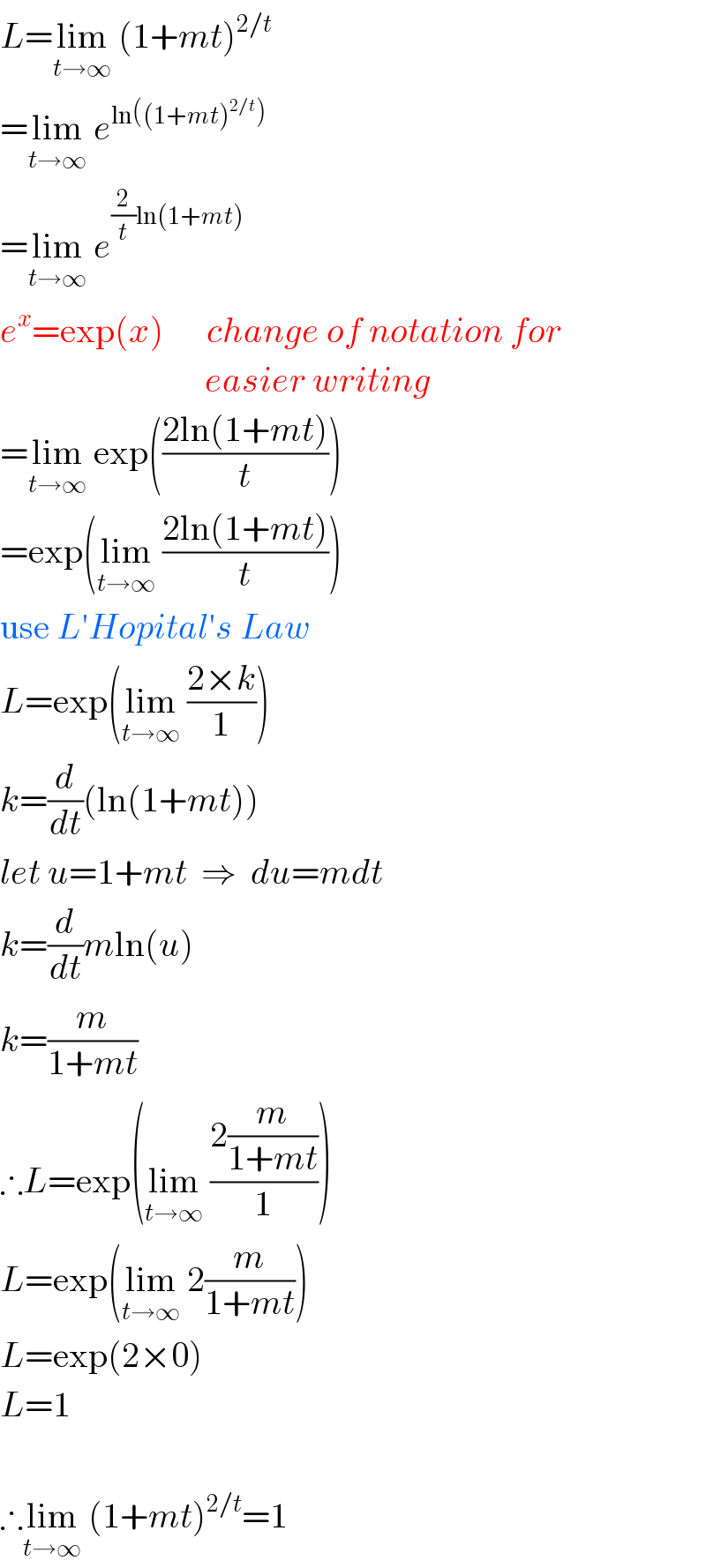
Question Number 5593 by sanusihammed last updated on 21/May/16
![Find the limit limit [1 + mt]^(2/t) t →∞](Q5593.png)
$${Find}\:{the}\:{limit} \\ $$$$ \\ $$$${limit}\:\:\:\:\:\:\:\left[\mathrm{1}\:+\:{mt}\right]^{\frac{\mathrm{2}}{{t}}} \\ $$$${t}\:\rightarrow\infty \\ $$
Answered by FilupSmith last updated on 21/May/16

$${L}=\underset{{t}\rightarrow\infty} {\mathrm{lim}}\:\left(\mathrm{1}+{mt}\right)^{\mathrm{2}/{t}} \\ $$$$=\underset{{t}\rightarrow\infty} {\mathrm{lim}}\:{e}^{\mathrm{ln}\left(\left(\mathrm{1}+{mt}\right)^{\mathrm{2}/{t}} \right)} \\ $$$$=\underset{{t}\rightarrow\infty} {\mathrm{lim}}\:{e}^{\frac{\mathrm{2}}{{t}}\mathrm{ln}\left(\mathrm{1}+{mt}\right)} \\ $$$${e}^{{x}} =\mathrm{exp}\left({x}\right)\:\:\:\:\:\:{change}\:{of}\:{notation}\:{for} \\ $$$$\:\:\:\:\:\:\:\:\:\:\:\:\:\:\:\:\:\:\:\:\:\:\:\:\:\:\:\:\:{easier}\:{writing} \\ $$$$=\underset{{t}\rightarrow\infty} {\mathrm{lim}}\:\mathrm{exp}\left(\frac{\mathrm{2ln}\left(\mathrm{1}+{mt}\right)}{{t}}\right) \\ $$$$=\mathrm{exp}\left(\underset{{t}\rightarrow\infty} {\mathrm{lim}}\:\frac{\mathrm{2ln}\left(\mathrm{1}+{mt}\right)}{{t}}\right) \\ $$$$\mathrm{use}\:{L}'{Hopital}'{s}\:{Law} \\ $$$${L}=\mathrm{exp}\left(\underset{{t}\rightarrow\infty} {\mathrm{lim}}\:\frac{\mathrm{2}×{k}}{\mathrm{1}}\right) \\ $$$${k}=\frac{{d}}{{dt}}\left(\mathrm{ln}\left(\mathrm{1}+{mt}\right)\right) \\ $$$${let}\:{u}=\mathrm{1}+{mt}\:\:\Rightarrow\:\:{du}={mdt} \\ $$$${k}=\frac{{d}}{{dt}}{m}\mathrm{ln}\left({u}\right) \\ $$$${k}=\frac{{m}}{\mathrm{1}+{mt}} \\ $$$$\therefore{L}=\mathrm{exp}\left(\underset{{t}\rightarrow\infty} {\mathrm{lim}}\:\frac{\mathrm{2}\frac{{m}}{\mathrm{1}+{mt}}}{\mathrm{1}}\right) \\ $$$${L}=\mathrm{exp}\left(\underset{{t}\rightarrow\infty} {\mathrm{lim}}\:\mathrm{2}\frac{{m}}{\mathrm{1}+{mt}}\right) \\ $$$${L}=\mathrm{exp}\left(\mathrm{2}×\mathrm{0}\right) \\ $$$${L}=\mathrm{1} \\ $$$$ \\ $$$$\therefore\underset{{t}\rightarrow\infty} {\mathrm{lim}}\:\left(\mathrm{1}+{mt}\right)^{\mathrm{2}/{t}} =\mathrm{1} \\ $$
Commented by FilupSmith last updated on 22/May/16

$$\mathrm{Not}\:\mathrm{that}\:\mathrm{I}\:\mathrm{can}\:\mathrm{work}\:\mathrm{out} \\ $$
Commented by FilupSmith last updated on 22/May/16

$$\mathrm{No}\:\mathrm{problem} \\ $$
Commented by sanusihammed last updated on 21/May/16

$${Thanks}\:{so}\:{much}.\:{God}\:{bless}\:{you} \\ $$
Commented by Rasheed Soomro last updated on 22/May/16

$$\mathrm{Could}\:\mathrm{the}\:\mathrm{problem}\:\mathrm{be}\:\mathrm{solved}\:\mathrm{without} \\ $$$$\mathrm{using}\:\mathrm{calculus}? \\ $$
